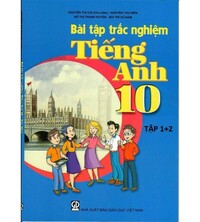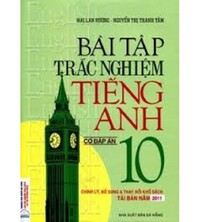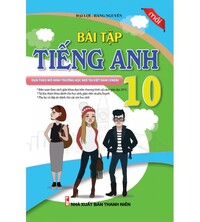Tiếng Anh 10 Unit 2 2C. Listening
1. Put the adjectives below into three groups: describing a) people, b) extreme sports and c) landscapes. Some adjectives can go into more than one group. 2. Describe the photo above. Where are the people? What are they doing? What kind of people do you think they are? Use adjectives from exercise 1 and words from lesson 2A on page 18. 3. Read the Listening Strategy. Then listen to six people talking about BASE jumping. Write the synonyms or words with the opposite meaning that they use for th
Bài 1
1. Put the adjectives below into three groups: describing a) people, b) extreme sports and c) landscapes. Some adjectives can go into more than one group.
(Xếp các tính từ bên dưới thành ba nhóm: mô tả a) người, b) thể thao mạo hiểm. c) phong cảnh. Một vài tính từ có thể xếp vào nhiều hơn một nhóm.)
Adjectives to describe adventure athletic brave impressive remote risky spectacular strong terrifying thrilling
Lời giải chi tiết:
People: athletic (lực lưỡng), brave (dũng cảm), impressive (oai vệ), strong (khỏe mạnh), terrifying (kinh hãi)
Extreme sports: risky (liều lĩnh), spectacular (thu hút sự chú ý), terrifying (hoảng sợ), thrilling (rùng mình)
Landscapes: impressive (ấn tưởng), remote (hẻo lánh), spectacular (hung vĩ)
Bài 2
2. Describe the photo above. Where are the people? What are they doing? What kind of people do you think they are? Use adjectives from exercise 1 and words from lesson 2A on page 18.
(Mô tả bức tranh bên dưới. Những người này đang ở đâu? Họ đang làm gì? Bạn nghĩ những người này là những ai? Sử dụng các tính từ trong bài tập 1 và các từ vựng trong bài 2A trang 18.)
Lời giải chi tiết:
They are in the top of a very high and steep mountain. They are going skydiving. (Họ đang ở trên một ngọn núi cao và dốc. Họ đang chơi nhảy dù.)
Bài 3
3. Read the Listening Strategy. Then listen to six people talking about BASE jumping. Write the synonyms or words with the opposite meaning that they use for the underlined words.
(Đọc Chiến thuật nghe. Sau đó nghe sáu người nói về môn nhảy dù mạo hiểm. Viết từ đồng nghĩa hoặc từ có nghĩa trái nghĩa với từ họ dùng cho các từ được gạch chân.)
Listening Strategy (Chiến thuật nghe)
The information that you need to understand in therecorded text may be expressed differently in the task.
(Thông tin bạn cần hiểu trong đoạn băng có thể được thể hiện khác đi trong câu hỏi.)
Listen out for synonyms of key words in the task. Key words are content words such as adjectives, nouns and verbs.
(Nghe rõ từ đồng nghĩa của từ khóa trong câu hỏi. Từ khóa là những từ như tính từ, danh từ và động từ.)
Listen out, too, for ways in which words with the opposite meaning, or negative verbs, correspond with key words in the task.
(Tương tự, nghe ra những từ với có nghĩa trải ngược, hoặc những động từ phủ định, tương ứng với các từ khóa trong câu hỏi.)
It’s rather cold today. >> It isn’t very warm today. (Trời hôm nay khá lạnh. >> Trời hôm nay không được ấm lắm.)
We won the match. >> We didn’t lose the match. (Chúng tôi đã thắng trận đấu. >> Chúng tôi đã không để thua trận đấu.)
1. Fred loves being in wild, far-away places. remote (Fred thích đến những nơi hoang dã, xa xôi.)
2. Sally says BASE jumping isn't popular with older people. (Sally nói rằng nhảy dù mạo hiểm không phổ biến với người già.)
3. Chris doesn't consider himself a courageous person. (Chris không cho rằng mình là người can đảm.)
4. Celina says people who aren't strong and fit shouldn't try BASE jumping. (Celina nói rằng những người không khỏe và cân đối không nên thử nhảy dù mạo hiểm.)
5. For Shelley, the appeal of BASE jumping is the breathtaking landscapes where you do it. (Với Shelly, sự hấp dẫn của nhảy dù mạo hiểm là phong cảnh ngoạn mục ở nơi thực hiện nhảy dù.)
6. Martin really didn't enjoy BASE jumping. (Martin thực sự không thích nhảy dù mạo hiểm lắm.)
Bài 4
4. Read the sentences. Can you think of synonyms for any of the underlined words? Write them in your notebook.
(Đọc các câu sau. Bạn có thể nghĩ ra từ đồng nghĩa nào cho các từ được gạch chân không? Viết chúng vào trong vở.)
1. Tanya likes extreme sports because they're dangerous. (Tanya thích thể thao mạo hiểm vì chúng nguy hiểm.)
2. A friend told Tanya to try BASE jumping. (Một người nói Tanya thử nhảy dù mạo hiểm.)
3. Tanya didn't enjoy her first experience of BASE jumping. (Tanya không thích trải nghiệm đầu tiên nhảy dù mạo hiểm của cô ấy lắm.)
4. The cliffs in Tonsai, Thailand are the perfect venue for BASE jumping, in Tanya's opinion. (Những dốc núi ở Tonsai, Thái Lan là nơi hoàn hảo cho nhảy dù mạo hiểm, theo quan điểm của Tanya.)
5. Tanya thinks the dangers of BASE jumping make women unwilling to try it. (Tanya nghĩ rằng những nguy hiểm của nhảy dù mạo hiểm khiến phụ nữ không sẵn sàng thử chơi.)
6. In Tanya's opinion, Roberta Mancino is a great sportswoman. (Trong suy nghĩ của Tanya thì Roberta Mancino là một vận động viên nữ tuyệt vời.)
Lời giải chi tiết:
1. like: love, (be) keen on, enjoy, ...
dangerous: risky, serious, threatening, ...
2. told (tell): say, speak, ...
3. didn't enjoy: hate, dislike, ...
4. venue: place, location, site, ...
5. danger: risk, threat, insecurity, ...
6. great: good, wonderful, awesome, ...
sportswoman: athlete, ...
Bài 5
5. Listen. Are the sentences in exercise 4 true or false? Write T or F.
(Nghe. Những câu trong bài tập 4 đúng hay sai. Viết T hoặc F.)
Bài 6
6. Work in pairs. Explain why you would or would not like to try BASE jumping. Give three reasons. Use the adjectives in exercise 1 and ideas from exercise 3 to help you.
(Làm việc theo cặp. Giải thích tại sao bạn muốn hoặc không muốn thử môn nhảy dù mạo hiểm. Đưa ra ba lý do. Sử dụng các tính từ ở bài tập 1 và ý tưởng ở bài tập 3 để giúp bạn.)
I don’t like BASE jumping because… (Tôi không thích môn nhày dù mạo hiểm là do…)
I’m afraid of height. (Tôi mắc chứng sợ độ cao…)
This sport is too risky. (Môn thể thao này quá nguy hiểm…)
I’m not strong enough. (Tôi không đủ khỏe…)
Search google: "từ khóa + timdapan.com" Ví dụ: "Tiếng Anh 10 Unit 2 2C. Listening timdapan.com"







